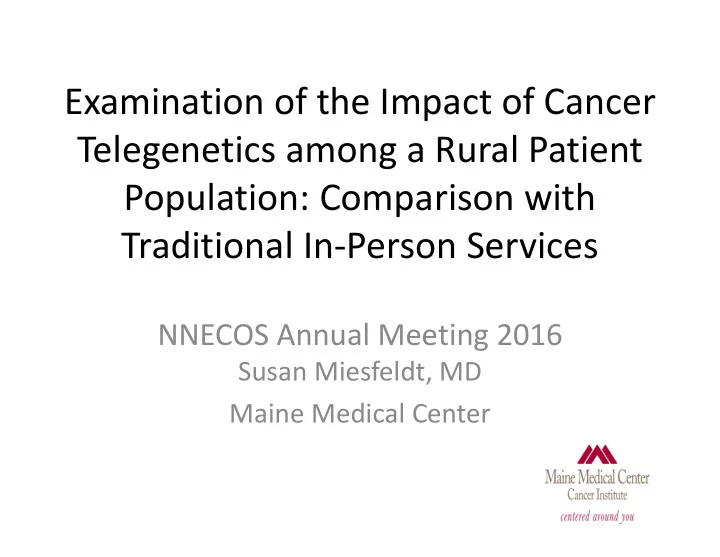

Examination of the Impact of Cancer Telegenetics among a Rural Patient Population: Comparison with Traditional In‐Person Services NNECOS Annual Meeting 2016 Susan Miesfeldt, MD Maine Medical Center
• This work was partially funded by the Maine Cancer Foundation
Background • New models of telecommunication, including two‐ way videoconferencing (telehealth), promise to address growing demands for cancer genetic counseling services • Little is known about the impact of cancer telegenetics among the geographically underserved • Improved awareness of the patient‐focused outcome of telegenetics is essential to scaling this model nationally • An understanding of patients’ attitudes regarding satisfaction with/acceptability of this technology is critical to widespread adoption and sustainability
Goals • To examine clinical outcome and attitudes/beliefs regarding cancer telegenetic services in Maine • To compare clinical outcome among telegenetics versus traditional in‐person patients
Maine Cancer Genetic Services Current cancer genetic services in Maine Maine Medical Center (MMC)^ Medical oncologist & cancer genetic counselor New England Cancer Specialists* Cancer genetic counselor * serves NECS patients ^ ^ Central Maine Medical Center Contracted genetic counselor Eastern Maine Medical Center Geneticist and contracted counselor • Gaps in access to high quality cancer genetic services in Maine are apparent, particularly for those from rurally remote regions of the state • ^MMC‐staffed telegenetic services provided in Augusta (MaineGeneral) and Belfast (Waldo County General Hospital) • All sites serve rural patients
Methods • Pre‐/post‐survey (immediate and 1‐month) administered to cancer telegenetics patients seen at two remote sites and control patients seen in‐person • Survey developed by study team using items from existing, validated instruments plus items developed based on study goals • It assessed: – Care impact on hereditary cancer knowledge and emotional status – Ease of access to services – Satisfaction with/acceptability of telegenetics
Results • Participants – A total of 174 responded to one or more surveys (106 remote; 68 control) – 158 (90%) returned pre‐ and immediate post‐ counseling surveys (90 remote; 68 control) – One‐month post‐counseling surveys were returned by 41/90 remote patients (46%) and 24/68 in‐person patients (35%) – Response to individual survey items varied
Sociodemographic characteristics Characteristic Remote In‐person Comparison n=106 n=68 p‐value Age in years (mean; SD) 55 (15.1) 49 (13.5) 0.02 Women (%) 83 84 0.55 Education level high 28 (26%) 6 (9%) 0.006 school or less (n;%) Rural county of 95 (90%) 27 (40%) <0.0001 residence (n;%) Cancer history 60 (57%) 29 (43%) 0.005 No difference in groups relative to race, ethnicity, perceived health insurance status or family history of cancer
Clinical Outcome: Group Comparisons Variable Remote Remote In‐person In‐person Change Pre Post Pre Post difference Mean (SD) Mean (SD) Mean (SD) Mean (SD) p‐value Breast ca 3.7 (2.25) 6.6*(1.54) 4.1 (2.18) 6.9*(1.63) 0.85 knowledge Colon ca 1.3 (0.98) 2.3*(0.86) 1.5 (0.94) 2.4*(0.71) 0.43 knowledge Anxiety 1.4 (1.84) 1.2 ⌃ (1.54) 1.0 (1.25) 0.8*(1.14) 0.59 Depression 0.90(1.53) 0.67*(1.31) 0.42(0.96) 0.35 (0.84) 0.09 *signifies statically significant change, pre‐ versus immediately post‐counseling ⌃ signifies borderline significance, pre‐ versus immediately post‐counseling Breast cancer knowledge measure = mean number of correct responses out of 9 Colorectal cancer knowledge measure = mean number of correct responses out of 4 Anxiety and Depression items depict mean measure level (sum of 2 items, 0‐3 scale; low to high symptom burden)
Clinical Impact 1‐month Post‐Counseling • Lower 1‐month response rate limited comparison with pre‐ and immediate post‐ counseling data – There was decline in colon cancer knowledge among both groups one month following counseling versus immediately post‐counseling – Anxiety and depression measures were lower in both groups at one month; comparing groups, measures remained higher in remote cohort
Impact of Telegenetics on Care Access 100% 90% 81% 80% 70% Telegenetic services 60% No telegenetic services 50% n = 102 40% 32% 30% 25% 24% 20% 13% 12% 9% 10% 5% 0% Travel 50+ miles Miss work Someone else Childcare miss work *Participant response to individual survey items varied.
Satisfaction with Technology 100% 99% 97% 97% 97% 100% 90% 90% 80% 70% 60% 50% 40% 30% 20% 10% 0% The process of talking was Did not need help using the The computer picture was I could hear the providers I trusted the conversation If the computer stopped clear (n=89) system (n=89) clear (n=90) clearly (n=90) was confidential (n=89) working I got help (n=39) Remote patients only, immediately post‐counseling
Acceptability of Telegenetic Services 100% 98% 100% 95% 87% 90% 80% 70% 60% 50% 40% 32% 30% 20% 10% 0% Telemedicine took care of my Better access to genetic Prefer to see a provider in Use telemedicine again (n=41) Overall happy with service needs (n=40) services with telemedicine person (n=40) (n=41) (n=41) Remote participants only; 1 month post‐counseling (n=41)
Conclusions • There were few differences in clinical outcome comparing traditional in‐person services with telegenetic services • The availability of telegenetics eased transportation needs and work absences • Despite occasional technical problems (equipment and internet access) remote study participants were satisfied with the quality of the technology used
Conclusions II • Although there was overall acceptance of telegenetics, nearly a third of remote patients noted preference for in‐person care • These data relate directly to the scalability of telegenetics as a means to extend access to cancer genetic counseling among those from geographically underserved areas regionally and nationally
Acknowledgments Nan Solomons PhD Norma Albrecht BS Amanda Lamb ScM Erica Jackson CRA Lee Lucas PhD Katherine Lafferty CGC Eileen McDonald MBA Kristen Langlois RN Kim Lenfestey LCSW This study was partially supported by the Maine Cancer Foundation
Recommend
More recommend